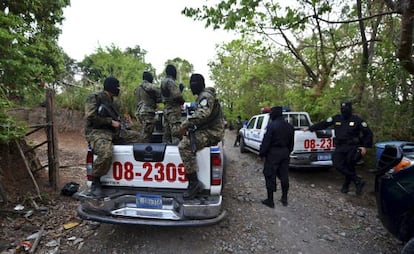Unraveling of gang truce brings fresh wave of violence to El Salvador
President Sánchez Cerán calls out military to deal with the rise in murders

The unraveling of an historic, internationally praised 2012 truce between two major rival street gangs in El Salvador is bringing a new wave of violence, which many fear is leading to a re-militarization of the country.
Bloody skirmishes between the military and gang members over the weekend have prompted the government of President Salvador Sánchez Cerén to take a tougher approach against the criminal organizations, which only two years ago had agreed to stop their murders and extortions.
El Salvador is one of the most violent countries in the world
On Monday, one soldier was killed and two others were injured during an attack at a naval base in the capital San Salvador. The day before, another officer was gunned down in an ambush.
But the worst incidents took place on Saturday.
Hours after President Sánchez Cerén ordered a strike force comprising three army battalions out on to the streets, nine members of the Barrio 18 gang were killed following a shootout with soldiers. Later that evening, an army sergeant was found murdered in his home.
Authorities said Saturday’s skirmish began when about 30 Barrio 18 gang members opened fire on the military in the capital. Photos that circulated on the internet showed the dead gang members laying in pools of blood with their arms crossed.
Many of those commenting on the internet photographs expressed sorrow for the “deaths of these youths,” while others expressed satisfaction – a clear reflection of the political polarization that remains from the 1980s civil war, which has left deep rifts in the tiny Central American nation.
Populated by six million people, El Salvador is one of the most violent countries in the world, with a homicide rate of 60 murders per 100,000 inhabitants. During the truce, the murder rate dropped from 15 to five killings a day. March was the worst month of this century so far, with 481 murders taking place across the country.
“There is a scheme being designed for war between gangs and law enforcement security units. And this is getting very dangerous,” said violence expert Jeannette Aguilar.
In 2012, the Barrio 18 and Mara Salvatrucha (MS-13) gangs agreed to a non-aggression pact with the Salvadoran government but asked if their leaders could be transferred from maximum security prisons to jails where they could receive visitors.
The truce hammered out by gang leaders was never officially recognized by the government of then President Mauricio Funes but it had been praised by the Organization of American States (OAS) and the Catholic Church.
But since 2014, there has been heated reaction against the government for holding talks with the gangs. The Funes administration decided to put a hold on measures that could have led to peace, specifically the one allowing leaders to hold meetings in jails.
With extortions, threats and murders on the rise, many Salvadorans are demanding the government take a tougher stance.
“One of the risks is that many of these actions against gang members are being committed outside the law,” said Aguilar. “And when there are actions outside the law civilians will always be affected.”
The Salvadoran defense chief has announced a shipment of new US military supplies
On Monday during a public address, Sánchez Cerén gave figures that reflect a stepping up of the government’s war with the gangs. About 30 percent of the murders that took place in March were gang members who were killed in skirmishes with the national police, he said.
Law enforcement authorities also said that since the beginning of the year 22 officers have died in attacks.
Defense Minister David Munguía also announced a shipment of new military supplies from the United States.
Violence expert Aguilar also points to the increase in the number of soldiers on the street – from 12,000 to 24,000 – and the creation of new units to deal with the gang problem.
The gangs are also beginning to take a tougher stance. Their leaders no longer enjoy the privileges in jail afforded to them when the truce was announced. They have been transferred to maximum security prisons and have no access to telephones in order to prevent them from giving orders to their members on the outside.
On April 18, a local newspaper reported that a classified intelligence report had revealed that the gangs were looking to purchase more weapons and undergo training while leaders have also given orders to increase the number of extortions.
Tu suscripción se está usando en otro dispositivo
¿Quieres añadir otro usuario a tu suscripción?
Si continúas leyendo en este dispositivo, no se podrá leer en el otro.
FlechaTu suscripción se está usando en otro dispositivo y solo puedes acceder a EL PAÍS desde un dispositivo a la vez.
Si quieres compartir tu cuenta, cambia tu suscripción a la modalidad Premium, así podrás añadir otro usuario. Cada uno accederá con su propia cuenta de email, lo que os permitirá personalizar vuestra experiencia en EL PAÍS.
En el caso de no saber quién está usando tu cuenta, te recomendamos cambiar tu contraseña aquí.
Si decides continuar compartiendo tu cuenta, este mensaje se mostrará en tu dispositivo y en el de la otra persona que está usando tu cuenta de forma indefinida, afectando a tu experiencia de lectura. Puedes consultar aquí los términos y condiciones de la suscripción digital.








































